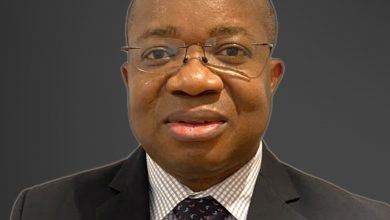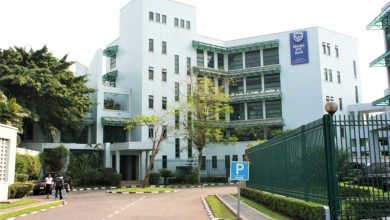
This article examines the ongoing legal dispute between FBN Holdings and Barbican Capital Ltd. within the context of ‘ownership ambiguity’ in Nigeria’s financial services industry and the regulatory implications of shareholding verification by the Central Bank of Nigeria within capital market norms.
Outline:
- Prologue
- Share Ownership in the Financial Services Industry;
- History of Shareholding with Legal Institutions;
- The Matter Arising between FBNH and Barbican Capital;
- Of Unclaimed Dividend, Intestate Shares, and Dematerialisation Process; and
- Concluding Thoughts.
Prologue
The FBNH-Barbican Capital contest mirrors a long-standing issue in and around the resolution of legacy shares transition and the process for managing the metamorphosis in Nigeria’s corporate ecosystem. While this ongoing dispute in the market space may be specific to FBNH and Barbican Capital, the historical context of shareholding disputes, transitions, or conversions in legacy institutions, particularly in periods of significant changes (inorganic) in Nigeria’s financial markets, can be traced far back in time. In the contemporary period, the firestorm of inorganic expansion of banks has led to situations where tactical share ownership reconstruction has been crucial to corporate control, shareholder consensus, and market credibility. Indeed, who owns what, how, and when has become a matter of market and regulatory interrogation. Is dominant ownership interest in a bank important? The short answer is yes. Who has the most significant equity interest in a bank gives a sense of a bank’s likely forward market strategy, as well as its operational discipline and direction.
Activist investors have a performance mindset that sees the business evolution of a bank in terms that are different from passive investors; dividend payments (loved by passive investors) are just part of the endgame equity playbook. In this context, who owns the biggest part of the equity pie becomes essential to defining corporate purpose, planning, and programmes. Indeed, with developments surrounding the number of Barbican shares held in FBNH, the size of the equity ownership is as important as how the shares were acquired, registered, and verified.
With the soul of Nigeria’s oldest lending group at a pawnshop of private interests, the market and its regulator must use the ambiguity of FBNH’s share ownership structure to illuminate the share ownership structures surrounding all banks in the country.
Analysts note that more recent developments in Nigeria’s banking sector point to the need to resolve the issue of legacy share transition problems where M&A’s take place such that an entity’s shareholders with negative equity may unwittingly end up being represented in the new entity, one that could signal a regulatory-induced distortion in share transitions and a tacit rewriting of the rules of financial management on corporate book value.
In a 2021 Memo to the Market, Proshare analysts argued that companies such as Honeywell had a long and checkered history with Ecobank Transnational Incorporated (ETI) that unveiled the underlying challenges in the management of bank debt, debtors, and, by extension, shareholding structure. In driving home the points in the report, the analysts argued that the main issues related to board governance during the various transactions and the timely required oversight from financial regulators.
Moving beyond this era, the market now appears willing to tackle the complexity surrounding the share acquisition process, and the lack of clarity concerning the sources of funds that creates a cloud around the understanding of who owned what, when, and how. One of such early moves was the conviction in the market place that in order to avoid a situation of double jeopardy for a listed financial institution, a Central Bank of Nigeria (CBN) capital verification was agreed on. This establishes the role of the CBN even as the operationality and synchronisation with auditors role/requirement still requires modality adjustments.
The Nigerian market has since moved on from this scenario with advancements in how the registrar function is evolving, how FMI’s (including CSCS) conduct operations, the disclosure requirements by the NGX, and the oversight delivered by the SEC; all enabled by the ease of electronic traceability, ensuring that such problems may not be relevant anymore.
The FBN matter therefore reflects on the institutions management of its transition phase into a new ownership, a peculiar situation that is a result of decades of layering that requires resolution; a matter the players and regulators have made a conscious decision to subject to public scrutiny. This is good for our markets and therefore offers a learning opportunity; one that has encouraged this analyst note.
Share Ownership in the Financial Services Industry
This corporate conundrum in Nigeria’s oldest financial institution, where the share ownership has become a matter of regulatory intervention due in part to gaps between registrars and regulatory recognition of shares is a litmus test for the market.
The process of validation and verification of the actual ownership of shares in financial institutions, especially banks, deserves to be removed from any cloud of uncertainty on discrepancies between regulatory confirmations and depository records. Thus, the appeal of Barbican Capital against FBNH, as detailed in a corporate release on Proshare, on share ownership to the tune of 2,340,599,305 units or 6.52%, which is reflected in the registrar’s records up to the time FBNH effected a change in registrar in 2022; but unverified by the Central Bank of Nigeria (CBN), and since discounted from Barbican Capital Shares as of H1 2024 by the CBN, underscores the most significant legacy transition issue in the Nigerian financial market.
Ideally, all shares based on the registrar’s record are entitled to dividends and must be accurately accounted for when calculating earnings per share. The manipulation or misrepresentation of such share ownership understates or overstates the ratios, which could alter the company’s valuations. In some other instances, even if all the shares are accounted for but locked in obscurity in terms of who owns what, there may be a high incidence of unclaimed dividends, which expose the institution to unethical and illegal practices by some entities, such as the purchase of shares with third-party unclaimed dividend, without proper documentation and approval. Besides undermining the financial system’s integrity, this locks the institution into a circle of ownership uncertainties and a continuous legal battle.
The regulatory and supervisory functions of the regulators may be mandated to enforce credible institutions across boards to ensure that all shares are properly validated and linked to verifiable sources of funding, but the onus is also on every institution in the financial services sector to leave no room for lapses and unethical actions. Instances where dominant shareholders have increased their equity through questionable means, often at the expense of minority shareholders, weaken the overall market credibility and prospects of raising additional capital. Proshare analysts have consistently called for a whole-of-government approach, which, in this instance, means a direct linkage and collaboration among regulatory bodies like the Securities and Exchange Commission (SEC), Central Bank of Nigeria (CBN), and the Nigerian Exchange Group (an SRO) to ensure that all shares are accurately accounted for and that ownership is transparent. The broader issue at stake is the financial sector’s trust deficit, particularly as banks are in the market to raise additional capital.
History of Shareholding with Legal Institutions
The Nigerian financial market has experienced significant changes in structure, market infrastructure, participation, and operators. The changes have engendered changes that in turn, has created an interest in concentrated Owenership of these institutions, with investors fighting for the same pie. This structure has changed the dynamics of the shareholding structure of some entities, especially matured companies with stable growth and fat cashflows.
Long-lived institutions seem typically attractive to investors as the longevity and ability to remain in business across different business cycles show resilience and adaptability. Hence, such companies’ shareholding structure seems highly competitive, with both the institutional and high-net-worth investors trying to get a significant bite. FBNH, the oldest Nigerian bank, is a big game in this chess match. The financial holding company has seen high net-worth investors tussle over the shares since 2021
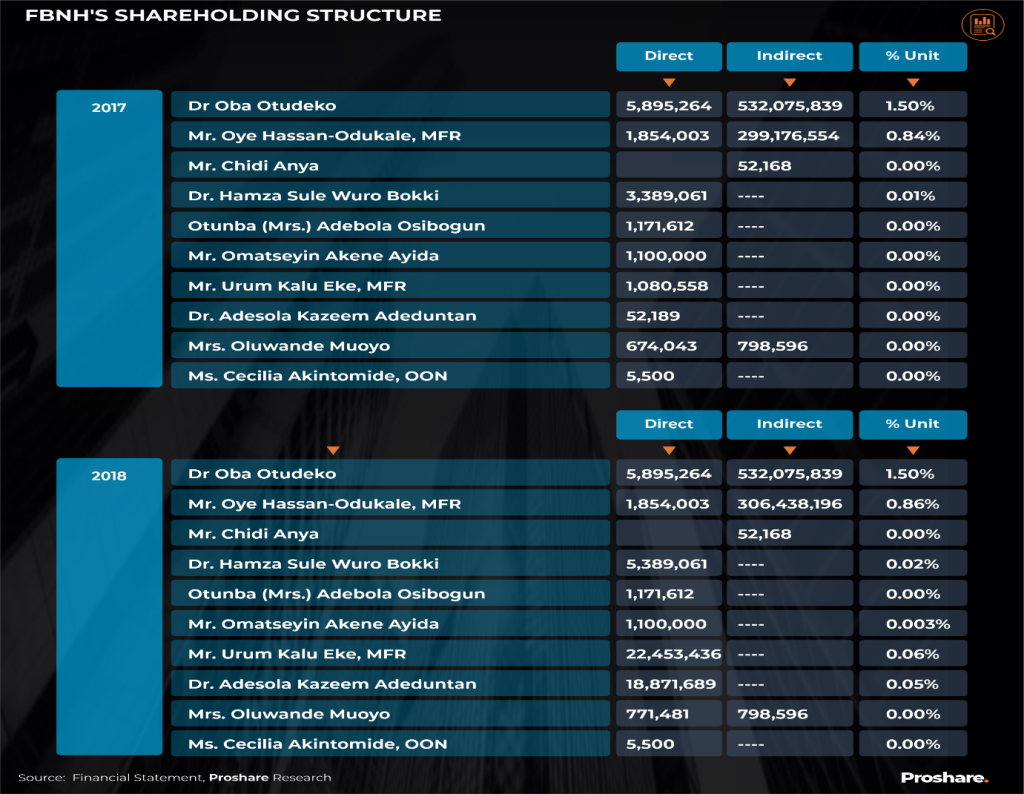
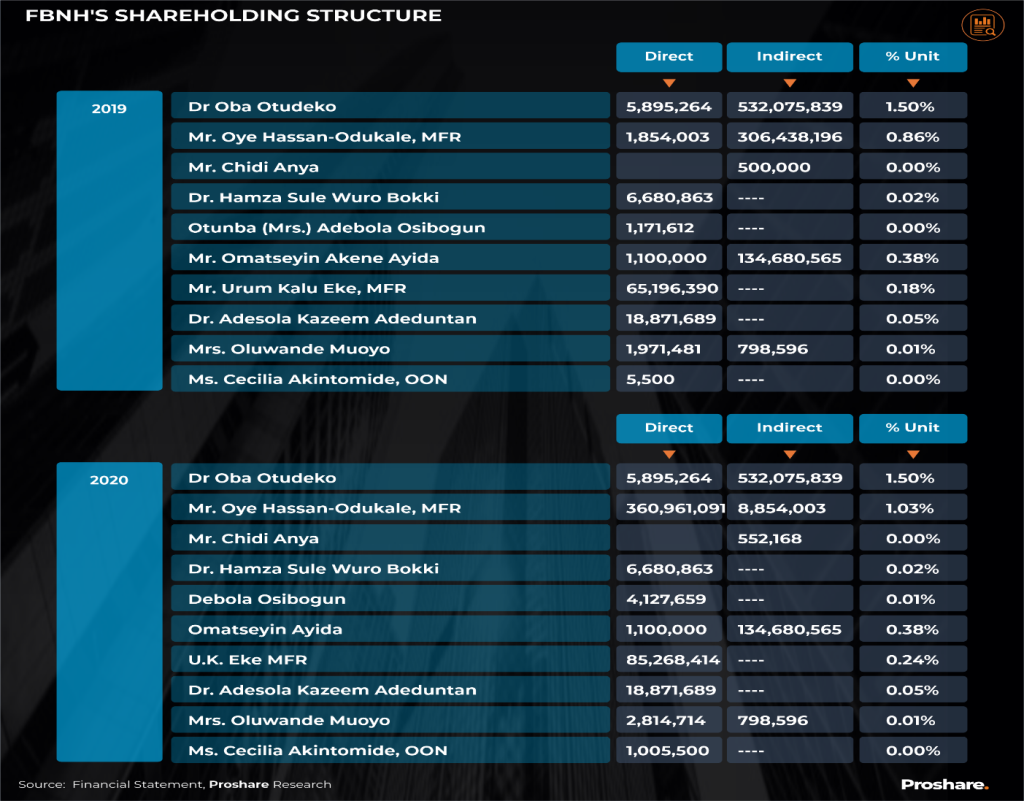
(see table 1 below).
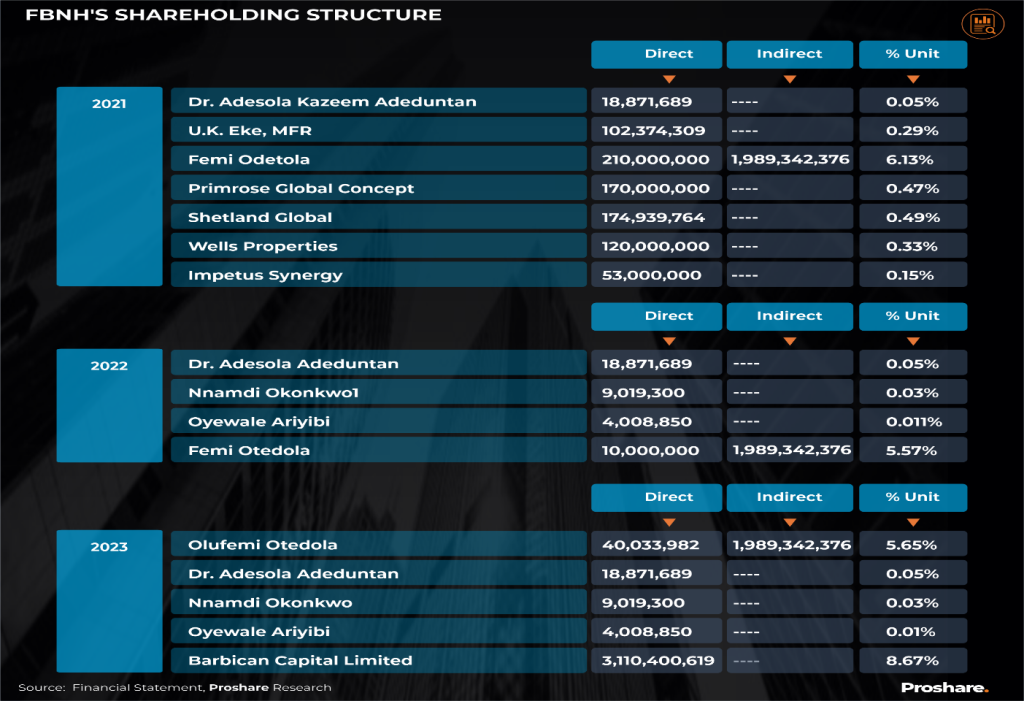
Between FBNH and Barbican Capital
The conflict between FBNH and Barbican Capital centres around the latter’s claim to a significant stake in FBNH. Barbican Capital, an affiliate of Honeywell Group Limited, asserted that it has a cumulative shareholding of 5,386,397,202 shares as of July 1, 2024, representing 15.1% of FBNH’s total outstanding shares of 35,895,292,791 units listed on the Nigerian Stock Exchange (NSE).
Barbican Capital noted that its 15.01% shares of FBNH are currently reflected in the dematerialised records of the Central Securities Clearing System Plc (CSCS) and appropriately captured by the registrars – Meristem Registrars and Probate Services Ltd. Thus, it further seeks to be accorded all the benefits of membership with respect to all shares recorded as owned by it in FBNH as reflected in the dematerialised records of the CSCS.
Proshare’s Economy & Market Intelligence Unit (EMI) appropriates that Barbican Capital’s positions are premised on the fact that the shares it owns are its personal property with all rights and privileges pertaining thereof and constitute proof of its shares with FBNH, based on Section 109, 110(1)(b) and 116 of the Companies and Allied Matter Act 2020. As such, neither FBNH nor the CBN can alter, reduce, or diminish its shares.
While the arguments are logically and fundamentally plausible as our Constitution preserves the rights and properties of all Nigerians, the issue is now be evaluated/examined from an industry-specific context. Banks, and now Financial Holding Companies (FHC) in Nigeria are governed primarily by the Banks and Other Financial Institutions Act (BOFIA) 2020 and guidelines by the CBN as provided for in the CBN Act 2007, both subject only to the 1999 Constitution.
The provision of Paragraph 3.2.1 of BOFIA 2020, as quoted by CBN’s 3rd Party Affidavit in reaction to the 3rd party notice, was clear on share ownership and its verification. According to the section, “An equity holding of 5% and above by any investor shall be subject to CBN’s prior approval. Where such shares are acquired through the capital market, the bank shall apply for a no objection letter from the CBN immediately after the acquisition.”
This is further corroborated by CBN guidelines, also quoted as; “Corporate Governance Guideline for Commercial, Merchant, Non-Interest and Payment Service Banks in Nigeria” effective from August 1, 2023, which requires that any entity acquiring more than a 5% shareholding in a financial holding company must either seek prior approval from the CBN or notify the CBN within seven days of the purchase to obtain a ‘No Objection’ or approval. According to sections 20.2(b) of the guideline, “CBN’s prior approval and No Objection shall be sought and obtained before any acquisition of shares of a bank (including through the capital market), that would result in equity holding of five per cent (5%) and above, by any investor.”
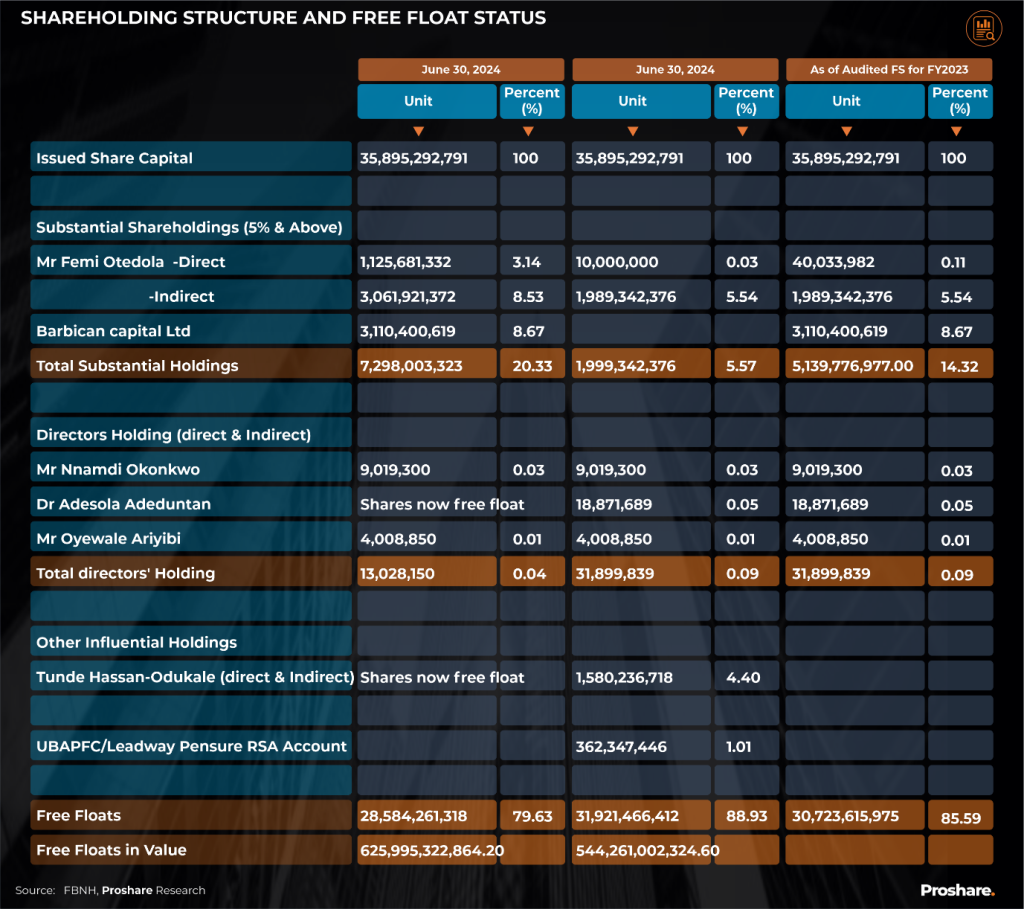
In this case, it behoves on Barbican capital to meet these provisions being the only condition to verify shares in the banking industry. Proshare’s Economy & Market Intelligence Unit (EMI) observed that FBNH notified the CBN of Barbican Capital’s shareholding exceeding the 5% threshold and initiated the verification process.
However, Barbican Capital, from records seen, has yet to provide sufficient documentation to verify the full extent of its shareholding to the satisfaction of the regulators. The CBN’s verification process only confirmed 3,110,400,619 shares (representing 8.67% of FBNH’s total outstanding shares), out of the 4,770,269,843 shares initially claimed by Barbican Capital. The remaining 2,340,599,305 shares, representing 6.52% of FBNH’s shares, could not be verified, according to their January 2024 letter, due to insufficient evidence provided by Barbican Capital.
Proshare’s Economy & Market Intelligence Unit (EMI) confirmed that other significant shareholders subjected to capital verification within the same period also had some portions of their shares unverified due to the lack of relevant contract notes and bank statements. Others, who provided all relevant documents, had all their shares sanctioned by the CBN.
Barbican Capital has justifiably relied on the fact that the Holding Company’s Registrars – Meristem Registrars and Probate Service Ltd – reflected its full shares. However, within the banking context, its inability to provide the requisite documents in its case: Financial Statements for 3 years, Tax Clearance Certificates for 3 years, and Statements of Accounts for the past 12 months appears to weaken the basis of its appeal from a procedural viewpoint despite its argument that it was incorporated in March 2023, a few months before the trial began.
Regardless of this, the statutory requirements cited by FBNH and, by extension, the regulator make it appear that Barbican Capital is attempting to bypass due process for FBNH to recognise its entire shareholding; and by extension, the ongoing verification by the CBN. Earlier communications of FBNH’s company secretary, in a series of letters, to Barbican Capital on the processes and requirements for the CBN verification, which cannot be bypassed under any circumstance, would appear to strengthen the Holding company’s argument (in the public court).
In what appears like a regulatory mediation, the CBN appears to have offered Oba Otudeko/Honeywell Group one representation on the Board, dependent upon the withdrawal of all court cases. Proshare analysts argue that Barbican (Oba Otudeko/Honeywell Group) is entitled to board representation proportionate to ownership regardless of his withdrawal from the existing cases, as he remains a significant shareholder, status quo ante bellum.
In the final analysis, and based on the current situation, until Barbican Capital obtains/secures a “No Objection” approval of the disputed shares; the records will show and rightfully reflect that the disputed 2.34bn shares are excluded from the records of the bank.
The next question must therefore be – what happens to this quantum post a decision by the courts?
Unclaimed Dividend, Intestate Shares, and Dematerialisation Process
Documentations reviewed will indicate that, underpinning the dispute between FBN Holdings and Barbican Capital lies the concerns (real and imagined) about several obscure issues, primarily involving the history of shareholding, share ownership processing, unclaimed dividends, and the issue of how shareholders caught in the dematerialisation process were resolved.
As the regulatory authority, the CBN, under this circumstance, retains the rightful mandate to seek to resolve same working with agents in the regulatory space to verify the legitimacy of share acquisitions to prevent fraudulent or opaque transactions that could undermine the financial system’s stability.
FBNH’s recognition of Barbican Capital’s shareholding at 3,110,400,619 units is according to our review, abiding with regulatory obligations. The CBN that approved the 8.67% can also approve the balance of 6.52% if provided with the requisite documents. Thus, the crux of the matter has been reduced to a compliance obligation requirement on the availability or unavailability of the documents required to support the Barbican Capital’s claim to the unverified shares. In more technical terms, it is important to discovery that where or under whose ownership the unverified shares are locked; based on H1 2024 FBNH results. Indeed, the company itself needs to provide clarity for market integrity, on where these shares are recorded.
Truth be told, where governance is compromised, the whole system of operational excellence is compromised and should the case be made that the control system, designed to be inter-dependent is convoluted and open to comprise, the appearance of compromise is more deadly that the act itself. In this case, it is natural for the enquiry/inquiry lenses to be heightened and the perception of compromise elevated. Yet, the truth must rely on the valid verifications models, templates and processes we have in place – hence the reason why this case is important to put to bed the challenge of legacy shares beyond a drama of personalities.
Closing Thoughts
Whilst we await the court decision on the matter, following the adjournment to October 02, 2024, for the hearing of the substantive suit, it is clear that FBNH’s counter affidavit and the reaction of CBN as the third party, based on regulatory provisions signal where the outcome is headed; subject to compliance by Barbican to produce the underlying records for the shares so claimed.
Broadly speaking, this offers us the opportunity for the market to validate the regulators’ role in share ownership verification, set a precedence for how to properly manage legacy shares transition, and reinforce the reliability of investors/decision-makers on financial statements as endorsed by the appointed auditors.
To enhance transparency and accountability in listed entities, institutions responsible for setting standards and regulations, particularly concerning the role of auditors, should consider requesting auditors to obtain share ownership verification letters approved by the regulator, for legacy entities.
CBN, SEC, and other financial system regulators have transparency and market sanctity objectives that are now becoming a front-and-centre issue and better collaboration is needed. It is trite information that the apex regulator, The SEC; must lead in this area to ensure that validity of shareholding records, protection of legitimate shareholders’ interests, and promotion of equity of legacy investors are treated as mutually beneficial objectives of the commission.
This matter is rested; until new evidence or facts arise that empower/engender a discovery that would necessitate a review based on changes in the people, process and professional rules required to guide conduct; and clarity on areas of improvement needed to make this work for the market we envision. We look forward to such progressive move by the judiciary, regulator and operators working in tandem to resolve this legacy issue and latch on to the changes occurring in our market

